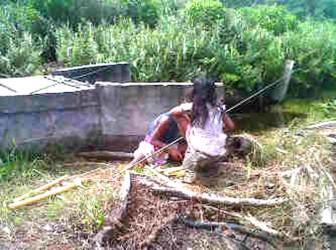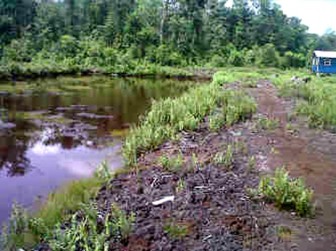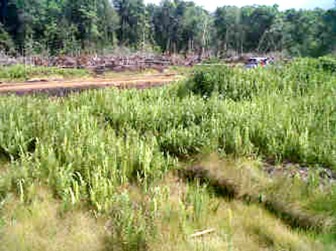Weed-filled ponds make up the hassar-rearing project at Tobago Hill, in the North West District of Region One, where a community is dwindling as residents struggle to adapt.
There was no fish, only vegetation in and around the four ponds seen by Stabroek News during a visit to the community last week and Toshao Edmund Santiago said he was unsure about the future of the project.
It was recently deemed a success by the Amerindian Affairs Minister Pauline Sukhai, who the Government Information Agency said commended residents for their hard work in preparing the fish ponds and caring and growing the fingerlings. The Minister had said that the Tobago Hill community would soon reap the first harvest of hassar reared under the National Secure Livelihoods Project (NSLP) in Region One.
“It is going to be a very good day for the villagers,” Sukhai was quoted as saying by GINA, and she commended Tobago Hill residents for their hard work in preparing the fish ponds and caring and growing the fingerlings. When she made this statement, the community immediately disputed it and Stabroek News visited the north west community on Wednesday to find out exactly what the situation was.
There was no sign of any fish in the pond when Stabroek News visited. Santiago said the villagers plan to clear the vegetation that has enveloped the project area in the coming months, while they hope for better weather in order to get the project off the ground.

Tobago Hill is populated predominantly by Amerindians from the Warrau tribe, who were relocated from the riverain Aruka Mouth, where they were threatened by erosion, to the hill top area. The number of residents has decreased within the past two years.
The community was expected to undertake the small scale rearing of the hassar in the four ponds, but intermittent rainfall has stalled it. The project had already suffered as a result of the poor initial design of the adjoining fish ponds, located about 400 yards in front of the community. It is part of an $88 million National Secure Livelihood Programme, which was launched by the government in 2009 to assist Region One communities.
Santiago noted that the projects implemented in the area by the government are left without much monitoring by the authorities. He explained that the fish project started in late 2009 and a Filipino Voluntary Services Overseas (VSO) volunteer, who was working with the village to develop the project, was credited with moving it forward. But according to him, the volunteer left last year, several months after waiting on the authorities to offer her a contract. He said the officer could not wait any longer and soon after she left.
Some time later, it was determined that the ponds were not dug according to plan and improper drainage was among the problems that later surfaced. “The problem with it is how they dig them (the ponds)… and we had to clear them out after because they had plenty sap… the problem is the drainage for the water,” Santiago said. This newspaper was told that there was no gravity flow to allow for drainage from the smaller ponds to the larger ponds. The villagers had placed more than 2,000 fish in the ponds but they did not survive for long.

“Right now we have to go out by the beach (Shell Beach on the Waini Coast) and catch the bigger hassar and put them in the pond because they will then lay and it will multiply,” Santiago said, adding, “But it depend on the weather because we need dry weather.”
Santiago chose not to comment on recent pronouncements by the Amerindian Affairs Ministry, but noted that the community has received “some amount of interest” from the government in recent times. At the same time, he said, there are several initiatives been pursued by the Village Council, which is in dire need of financial assistance to develop the community.
Breakdowns
Meanwhile, residents want a health hut to be constructed in the area in order for them to access medical care closer to home. Presently, they said that persons would walk a three mile distance to the health centre at the nearby community of Hosororo Hill, where they receive attention from the health worker.
Residents told this newspaper last week that medical personnel in the region appear apprehensive about travelling to Tobago Hill, given reports of Tuberculosis (TB) there. A resident noted that Health Minister Dr Bheri Ramsaran had travelled to the area several months ago and ordered the regional health authorities to screen persons for TB. “The minister come in and said that all who had it go in hospital after the check-up,” a woman stated.
A health worker in the region told this newspaper on Friday that “There is some kind of reluctance on the part of even the doctor at Mabaruma Hospital to go in to Tobago, because everybody frighten they get that disease.”
According to the health worker, there are multiple social and health-related “breakdowns” at Tobago Hill, which she attributed to a failure of residents to properly adapt to the new environment. She also noted that there are clear signs that the literacy level within the community is very low.

“The population [is] decreasing because the people aren’t accustomed to that environment, where they have to farm.
They accustom to the river, where they catch fish and it easier for them that way,” the health worker said. It was reported that several persons had returned to live along the Aruka River while others moved to other areas within the region.
According to Santiago, there is an ongoing education awareness initiative in which residents, mainly the elders of the village, take part in a basic education programme two days a week. The programme is being undertaken by a retired teacher, who travels to the area and runs two-hour sessions on each day. Santiago said that the response to the programme by the residents “is good,” while adding that it will add towards the development of the young community.
He said too that the village is also pursuing an agricultural programme, in which the residents will plant various crops on a hill top aback Tobago Hill. “We do not have funds for it… so we have to see what we can get and try to get it off,” Santiago, however, noted.
Tobago Hill, because of its remoteness, had been occupied by few persons prior to 2000. However, several years ago, the authorities collaborated with a non-governmental organisation to construct homes in the community and relocate close to 300 residents whose livelihoods were affected by the eroding shores of the Aruka River.




